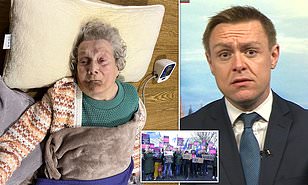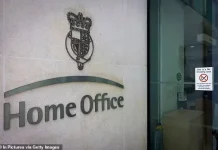93-year-old Elizabeth Jane Davies made to wait on the floor for 25 hours and 30 minutes as she suffered a hip fracture in a fall at her care home.
The aged pensioner was finally taken to Ysbyty Gwynedd in Bangor but then had to endure another 12-hour wait to be admitted to a ward.

Health minister Will Quince urged Britons not to ring 999 unless they are sure their condition is ‘life-threatening’. He said people should avoid doing anything ‘risky’.
In an event that saw soldiers being given last-minute training to fill in for striking ambulance drivers, this is the reality of the country as ambulances joined 10,000 nurses in mass NHS walkout.

At the moment, Health Secretary Steve Barclay is facing calls to resign unless he gets a grip on the crisis. He made a last ditch effort to avoid further chaos but failed, after discussions around pay were off the table.
After the meeting, he tweeted: ‘I hugely value the work of our NHS staff [and] it’s disappointing some union members are going ahead with further strike action – my door remains open to further talks.
‘My priority remains patient safety. We have contingency plans in place and I have met w seeith ambulance union reps today urging them to honour their commitment to provide responses to life-threatening emergency calls.’
On the other hand, Unions have also urged the Government to make an offer on pay, suggesting an agreement could be reached.
Onay Kasab, from Unite, warned after the meeting that ambulance strikes would escalate unless the Government agreed to pay negotiations.
He said: ‘I went in full of hope, unfortunately I’ve come out very, very disappointed, because all the Secretary of State wanted to talk about is what’s been done already, the discussions at a local level to make sure that emergencies are covered tomorrow.
‘The Government have got to engage on pay because these strikes will escalate otherwise, that is the reality.
‘Our members are absolutely determined to win not just the pay battle but to win the battle to save the NHS.’
Already, critical incidents have already been declared in hospital and ambulance services across the East Midlands, the North East, the North West and Wales.

Some areas are already recording six out of ten patients transported to hospital by ambulance being forced to wait outside.
It comes amid a week of industrial action that is seeing the UK thrown into turmoil, with strikes by Border Force, Royal Mail and rail unions in the lead up to Christmas.
On Monday, Mrs Davies underwent surgery to determine the extent of her injuries after a hip fracture was confirmed.
Her son Ian and daughter-in-law Susan, from Pwllheli, have been left beside themselves with worry.
‘It was very upsetting to have to see her lying on the floor screaming in pain for over 24 hours,’ said Ian.
The Welsh Ambulance Service has apologised for what happened. It blamed winter pressures, high demand and staff sickness levels.
Mrs Davies, who is originally from Mynytho, Gwynedd but moved to Pentreuchaf after marrying husband Hughie, has been a resident in a care home in Llanbedrog, Llyn Peninsula, for more than 17 years.
Still relatively fit, the mother-of-three uses a walking frame to get around the care home, which asked not to be named.
‘But at around 11.45am on Saturday, staff heard a bump and found her sprawled in the living room.
‘They called for an ambulance but were advised an ambulance wouldn’t be available for six to eight hours as they were so busy,’ said Ian.
‘They said my mother would be a priority because of her age. The care home then called us and we came immediately.’

Staff propped a pillow under Mrs Davies’ head and did their best to make her comfortable on the wooden floor. ‘They were excellent,’ said Ian, who like Susan is a community carer.
‘They put a small heater next to her to keep her warm in case she went into shock.
‘Staff phoned ambulance staff again once it became clear that there would be further delays. It’s understood the care home made a total of nine calls: a tenth was made by Ian and Susan.
‘We had to leave at midnight as we had to be up at 5.30am to go to work,’ said Susan.
‘My mother-in-law usually goes to bed at 6.30pm-7pm but she couldn’t and she was getting extremely tired.
‘Care home staff stayed with her through the night. ‘Each time they called [ambulance staff] for an update, they were told my mother was a priority and an ambulance would come as soon as possible,’ said Ian.
‘An ambulance finally arrived at around 1.15pm on Sunday, some 25 hours and 30 minutes after Elizabeth fell. She was taken to Ysbyty Gwynedd and eventually to a ward.
‘I don’t blame the ambulance staff because they are told what jobs to do and my mother wasn’t on the list,’ said Ian.
‘But I was very upset by what happened, it was unacceptable.
‘The whole of the NHS is struggling at the moment and one of the biggest problems is the shortage of carers.
‘They aren’t paid enough and no one wants to do the job.’
Stephen Sheldon, service manager for the Welsh Ambulance Service (WAS) in North Wales, extended his apologies to Mrs Davies for her long wait. He invited the family to contact the service directly to raise their concerns.












